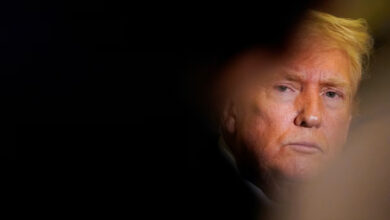The 2011 Cairo Documentary Festival, Egypt Rising, concluded its program on Saturday evening at the American University in Cairo’s Tahrir campus with a special Iranian program called Iranian Body Politic.
Two documentary films, “Plastic Flowers Never Die” (2008) by Roxanne Varzi and Davoud Geramifard’s “Iran: Voices of the Unheard” (2009) explore political dissent with the Iranian regime. By focusing on the post-1979 Iranian political consciousness, the two films complement one another while addressing the change in cultural ideologies pushed for by the state.
In “Plastic Flowers Never Die,” anthropologist and filmmaker Roxanne Varzi explores the use of propaganda to institutionalize the idea of martyrdom since the beginning of the Iran-Iraq War in 1980. To mobilize the masses, Ayatollah Khomeini dubbed the war “spiritual” — “a war of good against evil,” Varzi says in the film. Martyrdom became state policy. With more than 800,000 Iranians dying in the eight-year war, streets were renamed after martyrs and massive graveyards were erected with the pictures of the martyrs — some as young as fourteen — affixed to gravestones. On the back of every stone was a picture of Khomeini.
The Martyrs Museum in Tehran houses relics of the war martyrs, exhibited in glass vitrines along with heroic narratives. Vases of plastic flowers decorate the vitrines. A visiting high school student interviewed in the film shows how historical narratives are embedded amongst the youth — an idea which Varzi introduces at the beginning of the film, saying “film, like history, is easily re-edited.” Hearing so much about the war, the student decided to visit the museum and see for himself.
A local painter wanders the city, painting images of martyrs on the city walls. “We must not forget,” he tells Varzi. The enduring effect of the war’s legacy as promoted by the state is emphasized in Varzi’s closing remarks as she narrates how she mixes a poster of a Western national soccer team with images of martyrs.
"If I sit silently, I have sinned." With the iconic statement of former Iranian Prime Minister Mohamed Mosaddeq — who was removed from power by an American-led coup in 1953 — Geramifard begins “Iran: Voices of the Unheard.” Throughout the film, Geramifard documents a day in the lives of people from three distinct social groups suffering under the current Iranian regime. Shot without government permission (normally all filmmakers have to submit their proposed scripts to the Iranian Ministry of Culture for approval), the film attempts to shed light on the lives of social groups rarely represented in the discussions about Iran in the West.
In Shiraz, Hadi, an aging leftist revolutionary, continues his activism by introducing his students at a public high school to an alternative reading of Iran’s history. Hadi was imprisoned for eight years by the Pahlavi regime for his anti-regime activities, which included raiding the Central Bank of Iran. Released from prison after the 1979 Iranian Revolution, he took up teaching as an opportunity to introduce youth to philosophical discourses in his discussions on social, cultural and political life in contemporary Iran. The regime is trying to change the Iranian identity, Hadi tells his audience, citing the Iranian tradition of wine-making as an example for the state’s efforts to subvert cultural habits. Islam allows for people to disagree and it’s the stifling interpretation of religious texts that the regime is supporting its actions with, he argues.
In southern Iran, a thousand kilometers from the capital, lives a Ghashghai nomadic tribe living at subsistence levels. The livelihood of such tribes has been destroyed by the Iranian regime. "What the whites did to Native Americans, the state did to us," a family member says.
Back in Tehran, Geramifard follows Babak, a 29-year-old poet and employee of the Tehran Office of Arts and Culture. The young intellectual represents frustrations of educated youth living under a totalitarian regime. Babak challenges stereotypical images of Iran. "Do your viewers know that Derrida, Baudrillard and Umberto Eco are available in Iran?" he asks. At a gathering with his friends, Babak jokes about stories of oppression and economic disaster. One family died of cold when the natural gas supply was cut off in winter. The state responded by asking citizens to check their gas pipes for leaks. As the group of friends laugh, the bitterness of the situation becomes more poignant.




